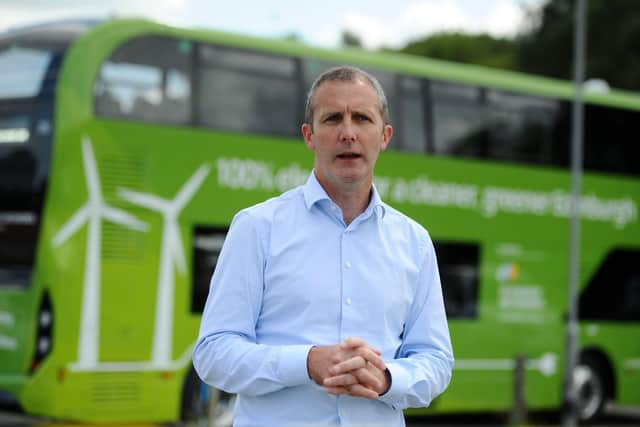Energy crisis: Warning of higher bills next year as Scottish Government urged to 'act now' to decarbonise homes
The predicted rise in bills from next April, which could add between £178 and £294 to the typical price for gas and electricity when the new energy cap is set by Ofgem, comes on top of the average £139 increase due next month and amid warnings from energy industry sources that “keeping the lights on” could become increasingly difficult this winter.
A quadruple whammy of a lack of wind to produce electricity from renewable sources, fire damage to the France-UK electricity import connector, North Sea gas platforms offline for maintenance and a high demand for liquified natural gas in Asia, has seen demand for gas outstrip supply, with rocketing wholesale prices forcing the collapse of several smaller energy firms unable to cope.


Advertisement
Hide AdAdvertisement
Hide AdAnd while bills will rise from October 1, as a result of the price cap set earlier this year, the current record energy market prices could now feed through to the cap for next April, with analysts predicting it could drive bills up by a further 14 per cent – forcing millions more into fuel poverty.
In Scotland around 613,000 people are already classed as living in fuel poverty and despite a £2 million splurge by housing associations on energy efficiency measures for social housing, the target to reduce the number of Scots in fuel poverty will not be met by 2032.
There are also concerns the Scottish Government is not acting with enough urgency, even in the run up to the COP26 conference in November, to alert private homeowners of the changes they need to make to their homes to make them energy efficient, to meet climate change targets.
Kate Morrison, Citizens Advice Scotland’s fair markets spokesperson, said: “Next Friday the energy price cap is set to rise. Those on default tariffs paying by direct debit will see an increase of around £139 from £1,138 to £1277. Prepayment customers will see an increase of around £153 from £1,156 to £1309.


“It’s important that consumers understand that the price rises we will see next week were announced in August, and don’t reflect the cost pressures on gas we have seen in recent weeks.
“Bluntly, consumers may see another record rise after the winter, when the new cap is set next April.”
Craig Lowrey, a senior consultant at the energy advisory Cornwall Insight, predicted the 14 per cent rise next year. He said: “We would need to see a material and sustained reduction in the wholesale market to avoid the kind of cap levels we are predicting for that period.”
Ms Morrison said while the price cap was “not a silver bullet”, it had “offered consumers some protection against more substantial hikes, at least in the short term”.
Advertisement
Hide AdAdvertisement
Hide AdShe said: “Vulnerable consumers also need to be able to access the Warm Home Discount – and this must be honoured in the event a supplier goes out of business and a new one appointed.
"Again, this discount is not perfect, and doesn’t reach all the people it should. In fact, around two thirds of those eligible miss out, but it is an absolute lifeline for people who do receive it.”
Pressure is now mounting on the UK Government to ease restrictions on the gas allowed to be used to power the electricity grid to resolve the crisis.
Neptune Energy, one of the biggest gas producers in the North Sea, said last year it could have produced around an extra 10.7 billion cubic feet of gas if restrictions on calorific value – which measures how much energy is in the gas – had been lowered.
If companies produce gas with too low or too high calorific content, they have to blend it with other gas to change its make-up, otherwise it cannot enter the grid. But sometimes there is not enough appropriate gas to blend with, meaning oil and gas companies leave gas in the ground they could otherwise have extracted.
Executive chairman Sam Laidlaw, who used to head British Gas owner Centrica, wrote to business secretary Kwasi Kwarteng on Monday and said the Health and Safety Executive (HSE) had already looked at the issue.
"Enabling the proposed relaxation of the specification immediately under emergency powers would allow the use of gas at a lower calorific value, which has already undergone technical review by HSE," he said.
"This would enable producers to supply more gas because it would reduce the requirements for blending needed under the current regulations.
Advertisement
Hide AdAdvertisement
Hide Ad"The change could be put in place immediately and remain in place for the gas year 2021/22, which begins in October."
Industry sources have also said they are increasingly concerned at the “vulnerability” of the electricity grid because of the current “thin generating margin” and described Mr Kwarteng’s assurance there was “no question of lights going out this winter” as “a bold statement”.
They pointed to the recent power cuts in Europe in January after biting cold caused power demand to surge, with the continent’s electricity network coming “close to a massive blackout” as a warning to the UK.
Transmission grids need to remain at a regular frequency of 50 hertz to operate smoothly and deviations, such as massive surges, can damage connected equipment, potentially causing blackouts for millions.
One industry source said: “We are in a very vulnerable position right now and the whole industry is preparing for the need to put in place emergency system restoration procedures.
"We are at the stage of wondering if we will be able to keep the lights on this winter. It’s been a perfect storm of unseen problems – such as the interconnector fire – and the decline in our nuclear plants and a lack of wind to generate enough from renewable sources.”
A former energy minister, Charles Hendry, said on Twitter that he had pushed for more gas storage to be built a decade ago, which would now be operational, but that it was “constantly blocked" by the Treasury “and subsequent DECC ministers.”
He said it would “not have solved the looming crisis, but would have given us more security”. Mr Hendry added: “The argument was always leave it to the market. Up to a point. The market does work – until the point when it goes catastrophically wrong. It’s then too late to fix the problem.”
Advertisement
Hide AdAdvertisement
Hide AdHowever, a UK government spokesman said: "We have been clear that this is not a question of security of supply. We have sufficient capacity to meet demand and do not expect gas supply emergencies to occur this winter."
A spokesperson for Ofgem said the regulator’s “number one priority” was to protect customers.
"We know this is a worrying time for many people,” the spokesperson said.
"The price cap will remain in place this winter to protect millions of customers from the sudden increases in global gas prices.
“However, if global gas prices remain high, then when we update the price cap in April unfortunately the level would increase."
On the Warm Homes Discount, they added: “We understand this may be a worrying time for many people who are facing financial hardship.
“Any customer who receives the Warm Homes Discount and is switched to a new supplier when a SoLR takes place will be able to reapply for the discount. Existing Warm Home Discount customers should contact their new supplier for details of how to reapply.
“If someone is struggling to pay their gas or electricity bills or they get into debt, they should contact their energy supplier as soon as possible to access the help available to them and can ask to be switched to a cheaper tariff.”
Advertisement
Hide AdAdvertisement
Hide AdMeanwhile the Scottish Government has been accused of short-changing homeowners to decarbonise their houses.
Scottish Conservative net zero spokesman Liam Kerr said the Programme for Government had pledged only about £1,800 to each Scottish home to make changes to heating systems, but the average cost of converting to a net zero system could be nearly £10,000 higher.
Mr Kerr said this would leave homeowners “to incur significant costs to help deliver the government’s targets”. He added: “The government has either got its sums wrong, or it genuinely expects homeowners to find the money to pay for its shortfall.”
Recent research showed that 48 per cent of homeowners would like to carry out improvements, but found it difficult to access the advice or information they need, while 38 per cent also think it would be too difficult to organise.
The Scottish Government pledged £1.8bn over the next five years to decarbonise homes, but its draft Heat in Buildings Strategy estimated the cost of transforming one million homes by 2030 is around £33bn.
Gillian Campbell of the Existing Homes Alliance said: "It’s clear that the bulk of this funding will need to come from the private sector – most of it from home owners paying for the upgrades. The Scottish Government estimates that the average cost of bringing a home up to EPCC [the energy efficiency rating] is £6,000 – but up to £11,000 for rural homes.”
She added: “This is a real challenge and we need to ensure the right balance between regulation, alongside a range of financial incentives and support to enable homeowners to improve their homes.
“We have strong foundations to build upon with Home Energy Scotland – and the existing fuel poverty and energy efficiency programmes work well, but could be doing so much more. This is why we’re calling for the funding for these schemes to be doubled.”
Advertisement
Hide AdAdvertisement
Hide AdShe added: “Now is the time for the Scottish Government to really act.”
Net zero secretary Michael Matheson said: “Our draft heat and buildings strategy acknowledges there are tensions between reducing emissions and ending fuel poverty.
"Many net zero heating systems are more costly to install and to run than higher emission alternatives. That’s why we are committed to supporting those who wish to take part in this transition while also protecting the most vulnerable to any increase in costs.
“This year we have increased funding for our energy efficiency and fuel poverty schemes allocating a record £50m for Warmer Homes Scotland to incentive the uptake of zero carbon heating benefiting communities not served by the gas grid.
"The social housing net zero fund will invest at least £100m over the next five years to support social housing landlords to contribute towards decarbonisation.”
A message from the Editor:
Thank you for reading this article. We're more reliant on your support than ever as the shift in consumer habits brought about by Coronavirus impacts our advertisers.
If you haven't already, please consider supporting our trusted, fact-checked journalism by taking out a digital subscription.
Comments
Want to join the conversation? Please or to comment on this article.
